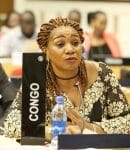The European Commission is considering challenging the Forest Law Enforcement, Governance and Trade (FLEGT) programme, a European Union (EU) scheme that encourages timber-producing countries to improve their forest governance in order to gain preferential access to EU markets. This is being done to the great regret of civil society and the governments of the signatory countries. This is a reaction from the Congolese Minister of Forest Economy. Rosalie Matondo calls on the EU to honour its commitments.
The tropical forests covering 65% of the Republic of Congo are a social, economic and environmental blessing.
Our forests provide rural communities with food, medicine and incomes. They contribute around 6% to our GDP and the sector employs more people than any other in the Congo, after oil and gas. They also are a critical instrument in the fight against the climate crisis: as part of the Congo Basin rainforest, the second biggest ‘ecological lung’ on the planet, they are vast repositories of carbon dioxide and biodiversity.
The health of our forests and the well-being of our nation are therefore inextricably entwined. So their destruction, whether from illegal logging, deadly bush fires linked to climate change, or other causes, will reverberate far beyond our borders.
In 2008 we began a long, arduous journey to improve the legal framework and give us new tools to protect our forests and ensure that the Republic of Congo increases the revenue collected from the timber sector, when we started negotiating a Voluntary Partnership Agreement (VPA) timber trade deal with the European Union (EU).
This deal, which was ratified in 2013, is part of the EU’s Forest Law Enforcement, Governance and Trade (FLEGT) Action Plan, which encourages timber-producing countries to improve forest governance and strengthen their laws against illegal logging, with the prospect of favoured access to EU markets.
The benefits have been significant. The VPA has helped the government translate our will to fight the illegal timber trade into concrete action.
This includes introducing a timber traceability system that allows us to track and uncover illegal timber; installing a database system which documents legality and transparency across timber supply chains; social obligations which require companies with timber concessions to contribute funds to the communities (resulting in roads, schools and other public services for impoverished and remote rural peoples); and giving civil society a role in decisions regarding forest management. In parallel to the VPA, our government has also taken matters into our own hands, culminating in a new forest code in July 2020 which is underpinned by the VPA’s principles.
Yet the momentum we have worked so hard to build over the past decade could be in jeopardy.
Earlier this year, the European Commission carried out a so-called FLEGT Fitness Check. Though few responded to it, the outcome was that the Commission is now considering dispensing with FLEGT licenses. These licenses guarantee that timber has been harvested, processed and exported legally. Once a country has been awarded one, it is considerably easier for them to export timber products to the EU.
Any move to get rid of FLEGT licenses, raises concerns for our government.
The FLEGT-VPA was an agreement based on equal consultations between two parties, so each party should have a say in decisions which fundamentally alter its basis.
If European markets are not open to Congolese and African wood, then the VPA becomes all but useless, and if the EU decides to throw out the licences which are the arbiter of the legality we have strived so hard for, both sides will lose.
In the Congo it could slow the momentum we have built in protecting our forests over the past decade; and for the EU it would mark a backward step from its global role fighting the illegal timber trade.
Both the EU and the Congo have invested immense time and money in the FLEGT-VPA, and our collaboration has produced tangible results which have inspired reforms beyond the forest sector.
It is a partnership that we value and which we need to build on if we are to protect the Congo Basin rainforest, which is so important for the balance of our planet.
Closing down FLEGT licenses and negating our commitments will not help us in this shared aim.
By Rosalie Matondo,
Republic of Congo’s
Minister of the Forest Economy







